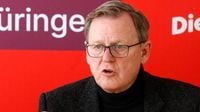In a heated episode of the ZDF talk show "Maybrit Illner" on March 27, 2025, political tensions flared as guests debated the ongoing coalition negotiations between the CDU/CSU and SPD. The episode, titled "Geld da, Strategie noch nicht – kann Schwarz-Rot noch scheitern?" (Money there, strategy not yet – can Black-Red still fail?), featured prominent figures including Alexander Dobrindt, the CSU State Group Chairman, Matthias Miersch, SPD General Secretary, and Bodo Ramelow from the Left Party.
Maybrit Illner opened the discussion by highlighting the challenges facing the coalition talks, particularly in light of recent public opinion, which has shown significant skepticism towards the CDU/CSU's promises. According to the ZDF Politbarometer, 73 percent of respondents, including 44 percent of CDU/CSU supporters, believe that the Union and its chancellor candidate, Friedrich Merz, have deceived voters. This sentiment was echoed by Robin Alexander, deputy editor-in-chief of "Die Welt," who noted that the CDU's current actions starkly contrast with their pre-election statements.
Illner pressed Dobrindt on the issue of credibility, referencing Merz's admission at the FAZ Congress on March 21, where he acknowledged the high price he had paid regarding his personal credibility. Dobrindt, however, attempted to downplay the significance of these concerns, stating, "Everyone must stop riding their hobbyhorses," emphasizing the need for unity and forward movement in the coalition talks.
The conversation escalated when Bodo Ramelow expressed his frustrations over the government's approach to energy policy, particularly the controversial 380-KV power line at Froschgrundsee in Bavaria. Ramelow's passionate outburst, where he repeatedly shouted about the power line, culminated in Dobrindt's sharp interjection: "Hören Sie auf, Unsinn zu erzählen! Reißen Sie sich mal zusammen, Mensch!" (Stop talking nonsense! Pull yourself together, man!). This moment underscored the heightened emotions surrounding the negotiations.
As the discussion progressed, Miersch expressed cautious optimism about reaching a consensus, citing the exploration paper that indicated a willingness to compromise. He remarked that the working groups had made valuable contributions, and the main negotiating group of 19 representatives from both parties would meet to tackle the contentious issues, including taxes, military service, migration, and development aid.
Despite Miersch's optimism, Alexander pointed out the lack of substantial progress, particularly in the finance working group, which he described as "erschrocken über die Kleinteiligkeit" (shocked by the small-scale nature) of their discussions. He questioned the effectiveness of the meetings, asking, "Warum haben die sich überhaupt getroffen?" (Why did they even meet?). Dobrindt defended the group's efforts, stating that their differing positions on taxes made agreement challenging.
The topic of defense spending emerged as a critical point of contention. Dobrindt asserted that there should be no upper limit on the credits allocated for defense, emphasizing the need for Germany to be unpredictable in its military capabilities to deter potential threats, particularly from Russia. He stated, "Wir wollen nicht ausrechenbar sein für Putin" (We do not want to be predictable for Putin), reinforcing the urgency for increased military investment.
Amidst the debates, Julia Jäkel, a media manager and advocate for a capable state, introduced the "Initiative für einen handlungsfähigen Staat" (Initiative for a Capable State), calling for fundamental reforms to improve Germany's administrative efficiency. She argued that the current bureaucratic structures are outdated and hinder the government's ability to respond effectively to modern challenges.
Ramelow, however, remained skeptical of the government's financial strategies, labeling the proposed 500 billion euro special fund as "investives Geld" (investment money) rather than debt. His comments prompted laughter and disbelief from the panel, highlighting the stark differences in perspective among the political factions. He insisted that the funds should not be viewed as mere debt but as necessary investments for the future.
As the episode concluded, Illner attempted to steer the conversation towards potential cabinet appointments in the anticipated coalition, but both Dobrindt and Miersch remained noncommittal, signaling the ongoing uncertainty surrounding the negotiations.
This episode of "Maybrit Illner" not only showcased the intense political atmosphere in Germany but also highlighted the significant challenges that lie ahead for the coalition partners. With public trust wavering and critical issues at stake, the path to a stable government remains fraught with obstacles.









